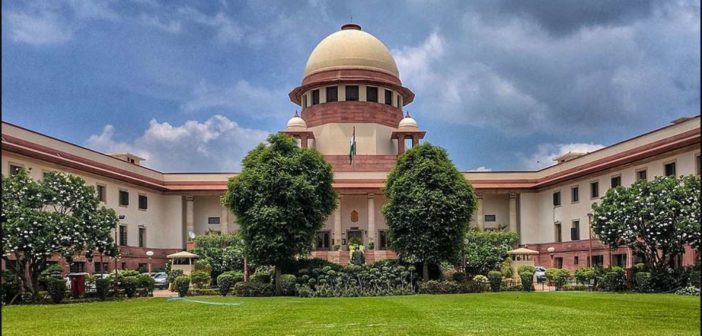In this edition of court judgements, we look at the Madras High Court’s judgement that smelling of alcohol per se does not constitute an offence, Supreme Court’s ruling that misuse of state machinery with ulterior motives by the woman police officer is an abuse of Power, that Writ Petitions cannot be allowed if they are not filed within reasonable time limitation, among others.
Madras HC: Smelling of Alcohol per se does not constitute an offence; Issues direction to make it mandatory to check Alcohol level in Injured or Deceased in Accident cases
In the case of Ramesh vs. Selvakumar, the High Court (HC) of Madras was dealing with an accident case involving questions of whether the smelling of alcohol and whether non-maintenance of safe distance could be treated as contributory negligence in an accident case.
The facts of the case were that Ramesh, the Appellant, was riding on a two-wheeler on a certain road between Esanai and Anukoor in Tamil Nadu. While riding, he had hit a Lorry going running before him and sustained multiple injuries including disability, loss of income, etc. The cause of the accident was the application of sudden break by Lorry Driver. Subsequently, the Accident Tribunal, which considered the matter, concluded that the Appellant had suffered a loss of about 3,07,904 rupees, due to the accident. However, the Tribunal had only awarded 50% of this amount to be paid as compensation, by finding that the Appellant was also responsible for losses suffered by him due to his negligence in not keeping a safe distance from the Lorry. Additionally, it was also recorded in medical records that the Appellant had also smelled Alcohol before riding the two-wheeler, which was also taken as a fact contributing to the negligence of the Appellant. Aggrieved by the lower compensation awarded to him, the Appellant filed an Appeal against the order of the Tribunal.
Taking these facts into consideration, the HC held that smelling Alcohol itself does not constitute an offence, as the Motor Vehicle Act itself notes that the criminal offence is said to have been committed if only alcohol limit crosses 30 mg per 100 ml of blood. However, in the present case, the Appellant had only smelled Alcohol, not even consumed it. Further, the court has also held that in most cases, it becomes very difficult for the following vehicle drivers to avoid an accident when the vehicle running before it comes to a grinding halt due to the application of a sudden break.
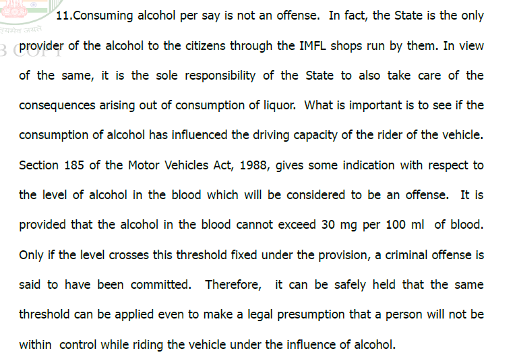
Accordingly, the HC held that the Appellant is not guilty of negligence. Therefore, it has awarded a compensation of about 3,53,904 rupees payable to the Appellant.
Along with these, the HC also noted that in many cases of similar nature, the injured or deceased, when they are brought to the hospital, smell alcohol in their breath. Therefore, HC issued a direction to Principal Secretary, of the Ministry of Health and Family Welfare to issue a circular to all the Hospitals to make it mandatory in all cases where the injured or the deceased are brought to the hospital and smell alcohol, the level of alcohol in the blood shall be assessed and the same must be noted in the relevant records, as such an exercise will enable the Court to come to correct conclusions.
SC: Misuse of State Machinery with Ulterior Motives by the Woman Police Officer is an abuse of Power
In the case of Parteek Bansal vs. State of Rajasthan & Ors, the Appellant and second respondent are Husband and Wife, whose marriage was solemnized in March 2015, in Udaipur, Rajasthan. By profession, both of them are police officers. In October 2015, the third respondent, who is the father of his wife (respondent no. 2), filed a criminal complaint against the Appellant under Sections 498 (A) 406, 384, 420 and 120(B) of the Indian Penal Code (IPC) in Hisar, Haryana. While the commission of the alleged offence had taken place in Udaipur, Rajasthan, the FIR was first filed in Hisar, with the reason that the person aggrieved, the wife, at the time of filing of the complaint was in Hisar. A few days later, Respondent No. 3 filed another complaint against the Appellant with the same facts and allegations in Udaipur, Rajasthan. The first complaint was investigated by the police of Hisar, and the trial court had acquitted the Appellant of the charges laid against him. In the meantime, the Appellant had filed a petition under Section 282 of the Criminal Procedure Code (CrPC) before the Rajasthan HC to quash the FIR filed against him in Udaipur, Rajasthan. This was dismissed on the grounds that the complaint to the Rajasthan police was filed before the complaint was made to Haryana police and that the Rajasthan police were not aware of the complaint filed before the Haryana Police. Aggrieved by the judgment of the HC, the Appellant approached SC.
When the matter was taken up, the SC noted that the respondent wife, using her position as a police officer, managed to get the complaint first filed in Hisar through her father. Later, as she moved to her hometown Udaipur, another complaint was filed. Further, the court also noted that neither of the respondents have entered the witness box when the trial was going on before the trial court in Hisar. It was also recorded in a complaint filed before the Rajasthan police that the same complaint was also filed before the Haryana police. Taking these factors into consideration, the SC found that the Rajasthan HC had erred in not noting these facts. Accordingly, it quashed the judgment of the Rajasthan HC and FIR filed against the Appellant.
As for the respondents, the SC found that they had misused their official positions and have caused harassment to the appellant and wasted precious time of the investigating agency and the court. Therefore, it has imposed a fine of Rs. 5,00,000.
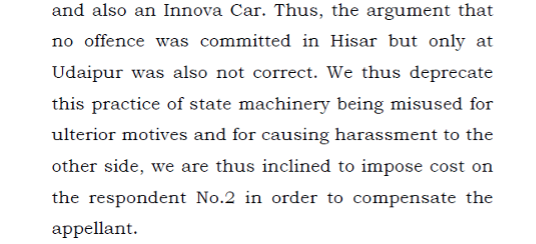
SC: Writ Petitions cannot be allowed if they are not filed within reasonable time limitation
In the case of Mrinmoy Maity vs. Chhanda Koley & Ors, the SC was dealing with the question of whether the delay caused in filing the Writ Petition (WP) relating to the exercise of private rights can be allowed and grant the relief of prayer made in the Appeal.
The facts of the case were that the Appellant and Respondent were the successful bidders for the grant of LPG distributorship in the year 2013. Upon the casting of lots, the Appellant was granted distributorship in June 2014. In March 2017, after a lapse of about 4 years, the second respondent, who lost the distributorship during the lots, filed a complaint before the BPCL, the LPG agency. The grievance was that the land shown by the Appellant for distribution is a Barga land and same cannot be considered for establishing a distributor unit. But this was declined by BPCL as the Appellant had already filed an application for Alternate Land and that it was processed by it. Aggrieved by it, the Appellant filed a Writ Petition before the HC. The single bench declined the petition, while the division bench allowed it and held that orders given by BPCL in favour of the Appellant were invalid. Aggrieved by the order of the division bench, the Appellant approached SC.
The SC noted that distributorship for the Appellant was given way back in 2014. The complaint was filed by the Respondent only when the alternate land for the site was chosen in 2017. By virtue of this, the Respondent has allowed for drifting away of his rights. Further, the Respondent also did not exhibit any stiff resistance on the alternative land chosen by the Appellant.
Therefore, the court held that though there is no fixed period of limitation prescribed for entertaining WPs, however, it is to be seen by the courts whether they have been filed within reasonable time and whether the cause of action invoked is a live cause for action. In absence of these, the HCs should not entertain WPs filed after the lapse of reasonable time within which rights which are petitioned can be claimed.
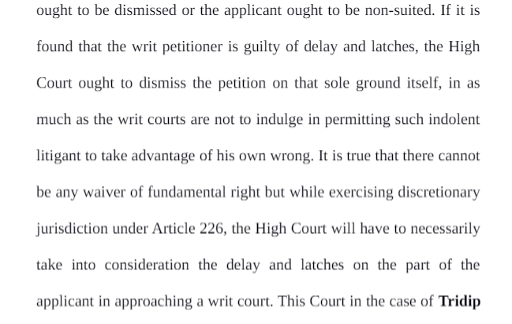
Accordingly, the SC upheld the single bench judgment by setting aside the division bench judgment.
Bombay HC: Adultery is a ground for Divorce, but it cannot be used to Deny Child’s custody
In the case of X vs. Y, the Bombay HC was dealing with a question of granting the custody of a 9-year-old minor girl to the mother who was accused of adulterous behaviour.
The facts of the case were that Husband (Petitioner), and Wife (Respondent) were married in 2010. A girl child was born to them in 2015. Both parents have started living separately from one another due to the alleged cruelty exhibited by one another and vice-versa. In the year 2020, the divorce petition was filed, which is under consideration before the Family Court (FC). Initially, the child was in the custody of her Husband, while the Wife was only allowed virtual access of the Child. In the later days, the custody of the child was given to the Wife, who is a Doctor by profession. However, the Husband filed a case in FC seeking the permanent custody of the child by alleging the adulterous behaviour of the Wife. This was dismissed by FC. Aggrieved by it, the Petitioner approached HC.
The HC noted that in order to establish the alleged adulterous behaviour of the Wife, the Husband resorted to false means such as obtaining information about family matters from the school authorities of daughter and writing letters with forged handwriting of the daughter, etc.
Firstly, the HC held that school authorities had no power to intervene in the matters of family. On the questions of custody, it noted the Wife is a doctor by profession, and has her mother at her house to take care of the child in the absence of the Wife. Whereas, the Husband, who is a Software Engineer, and his family are not in the same position to give better custody to the child. In addition, the girl is of pre-puberty age. Therefore, the custody of the child must remain with the wife.
On the questions of alleged adulterous behaviour due to which the custody of the child was sought by Husband, the HC held it is not proved yet before the FC. As such adultery is a ground for Divorce, but not for seeking custody of the child, as held by SC in several cases.
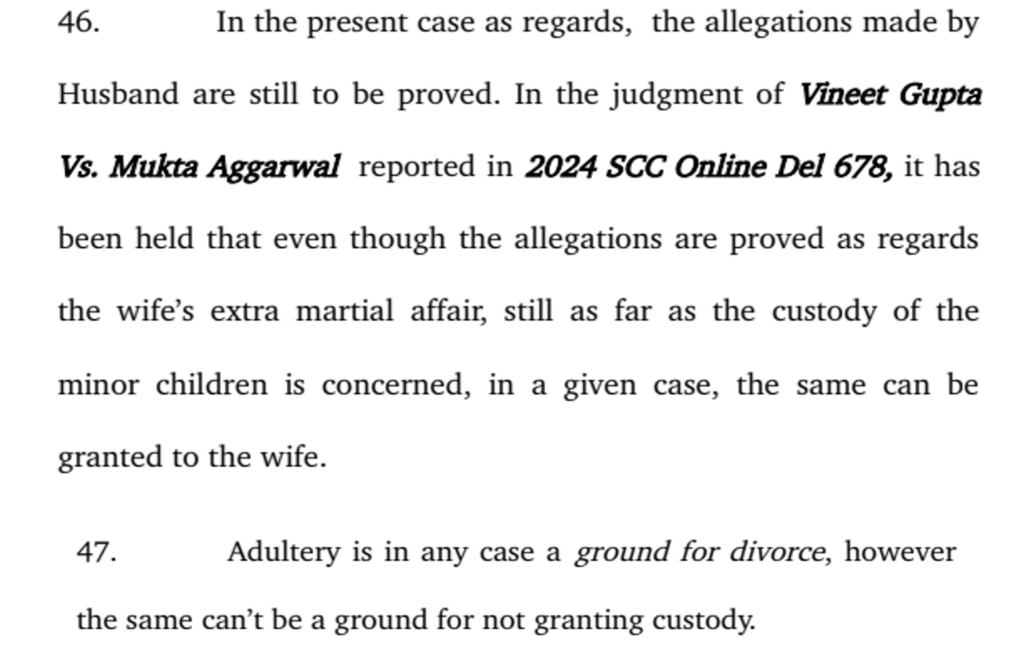
Accordingly, the HC dismissed the petition of the Husband.
SC: Orders for Medical Examination of Minor for Termination of Pregnancy
In the case of A vs. State of Maharashtra, the SC ordered for urgent medical examination of 14-year-old minor girl who was pregnant. The facts of the case were that the minor girl was found pregnant with the alleged sexual assault committed against her. The mother of the child approached Bombay HC seeking the medical termination of her pregnancy, which was rejected by the same court. In rejecting the same, the HC relied on two of the medical reports, one prepared by the Department of Obstetrics Gynaecology of the Government Medical College and the other by Sir J J Group of Hospitals.
The SC noted that the second medical report strikingly does not contain an evaluation of the physical and mental status of the minor, such as the background leading up to the pregnancy, including the alleged sexual assault, etc. Therefore, the SC ordered a fresh examination of the minor girl, including the necessity of termination of pregnancy.
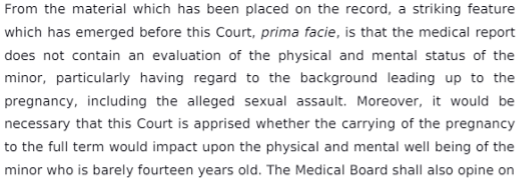
In the subsequent order, the SC allowed the termination of the pregnancy, based on reasons that the alleged sexual assault had happened to a minor girl, and she was unaware of her pregnancy until the last stage. The medical opinion of the doctors was that the continuation of pregnancy against the will of the girl may impact the girl’s mental and physical health and that the termination at this stage is less risky compared to the next stages.


